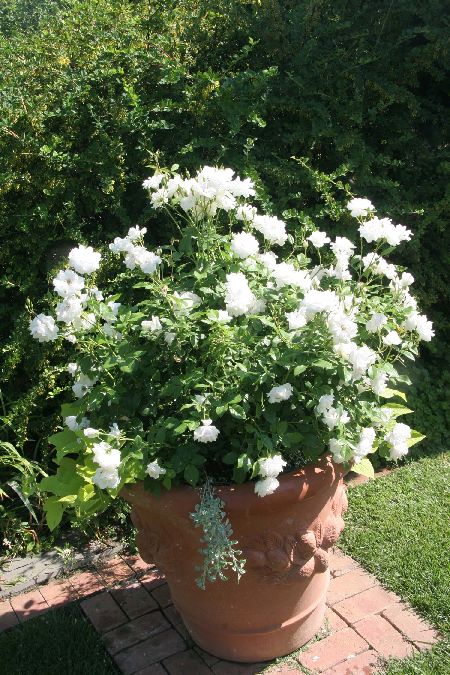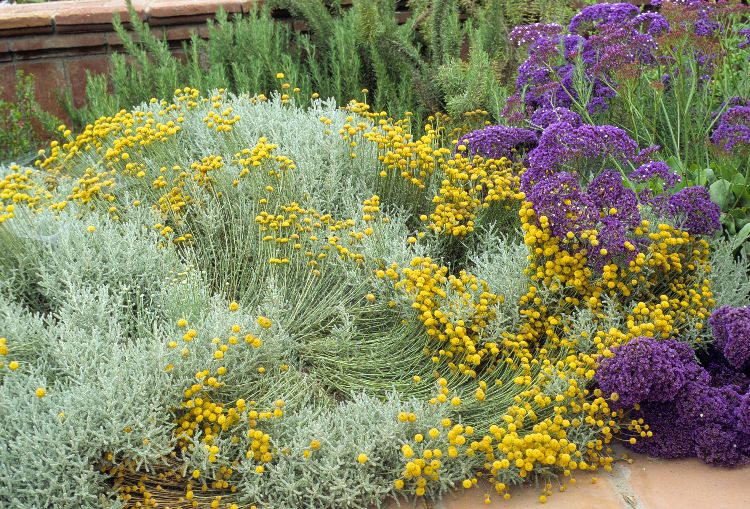Pyracantha angustifolia
Narrowleaf Firethorn
A large shrub with thorny branches, Narrowleaf Firethorn works well as a screen or barrier plant. White flowers in late spring are followed by clusters of orange berries. They remain on the plant into winter. 'Yukon Belle' is a superior selection. Canopy coverage: 50 square feet.
[Read More]Quercus gambellii
Gambel's Oak, Scrub Oak
Grow as a tree or shrub; low branching habit makes it ideal to form natural screens and thickets. Leaves (see photo) are deeply lobed, they turn brown or red in fall. Acorns attract birds and small mammals. Canopy coverage: 314 square feet.
[Read More]Rhus aromatica
Fragrant Sumac
Fragrant Sumac is a large, wide-spreading shrub with dense foliage. The leaves emit a pleasant fragrance when brushed or crushed. They turn orange then red in fall. Showy, edible red berries follow the flowers. 'Gro Low' , Dwarf Fragrant Sumac, shown in photos, reaches just 2 feet high, spreading 6 to 8 feet wide. Canopy coverage: 79 square feet.
[Read More]Rhus trilobata
Squaw Bush
Squaw Bush is a good choice for a low-maintenance, naturalistic shrub. Yellow to red fall color is an attraction, as are the bright red berries. Canopy coverage: 113 square feet.
[Read More]Rhus typhina
Staghorn Sumac
Staghorn Sumac is a large, spreading shrub that expands its territory by suckers, colonizing the surrounding area, so it is not the best choice for small, finite locations. New growth on branches is covered with dense fine hairs reminiscent of staghorns. Attractions include brilliant, red fall color, and red fruit that grow in upright, pyramidal clusters. Canopy coverage: 177 square feet.
[Read More]Rhus typhina 'Laciniata'
Cutleaf Staghorn Sumac
Cutleaf Staghorn Sumac is a tough-minded cultivar (cultivated variety) of Staghorn Sumac. As you would expect, leaves are finely dissected. Like the species new growth on branches is covered with dense fine hairs reminiscent of staghorns. It also produces brilliant, red and orange fall color, and red fruit that grow in upright, pyramidal clusters. Canopy coverage: 50 square feet.
[Read More]Ribes alpinum
Alpine Currant
Alpine Currant is a well-behaved, rounded, compact shrub with dense, twiggy growth. Midspring flowers are not terribly showy, and are followed by red fruit. Grows in almost any soil. Canopy coverage: 20 square feet.
[Read More]Ribes aureum
Yellow-Flowering Currant
Yellow-Flowering Currant becomes a broad, rounded shrub. Attractions include the typically fragrant, yellow spring flowers, which are followed by edible berries in summer that turn from yellow to red to black. Canopy coverage: 26 square feet.
[Read More]Ribes cereum
Squaw Currant, Wax Currant
Squaw Currant, as other Currants, becomes a dense, compact, rounded shrub. The bright red berries are an attraction, coming in late summer. Accepts sandy to clay soils. Canopy coverage: 13 square feet.
[Read More]Robinia neomexicana
New Mexico Locust, Desert Locust
New Mexico Locust can be grown as a tree or shrub but most often a thicket-forming, spiny shrub, useful as a barrier or screen. Note that seeds are poisonous. Flowers are fragrant and are profuse in clusters. The interesting seed pods are dark brown, hairy, up to 4 inches long, and hang on branches for a long time. Canopy coverage: 113 square feet.
[Read More]Rosa foetida bicolor
Austrian Copper Rose
Austrian Copper is an old garden rose that makes an excellent flowering shrub and security screen. Prickly branches grow in an upright and arching form. Susceptible to blackspot disease. Canopy coverage: 20 square feet.
[Read More]Rosa foetida persiana
Persian Yellow Rose
Persian Yellow is an old garden rose introduced in the 1830s that makes an excellent flowering shrub and security screen. Blooms once a year but profuse in late spring to early summer. Flowers are lightly fragrant. Canopy coverage: 28 square feet.
[Read More]Rosa glauca
Shrub Rose
An Old Garden Rose that serves as a large shrub in the landscape. Interesting foliage in shades of gray-green and purple exist on the canes at the same time. Flowers are small but a striking deep pink color and have a slight fragrance. Large orange-red hips, the seed capsules of Roses, follow flowers and are ornamental as they remain on plant into winter. Canopy coverage: 20 square feet.
[Read More]
Rosa species
Shrub Rose
There are of course numerous Rose varieties available in every size, flower color and fragrance. Floribunda forms are common Shrub Roses. Also consider David Austin landscape Roses, as well as Old Garden Roses. Photos: red rose hips; 'Iceberg' in container; hot pink 'Old Blush'; white 'Sally Holmes' in landscape and miniature 'Poker Chip'. Canopy coverage: 28 square feet.
[Read More]Rubus parviflorus
Thimbleberry
Thimbleberry is a shrub for the natural garden, where it can ramble and spread as it does in the wild. It can reach 8 feet high and as wide but typically remains smaller. The 2-inch flowers are fragrant. Edible but delicate berries that require careful handling follow flowers in midsummer. They are eaten fresh and used to make jams. Canopy coverage: 50 square feet.
[Read More]Salvia azurea var. grandiflora
Prairie Sage, Pitcher Sage
Prairie Sage, also known as Pitcher Sage, is a shrubby perennial with sky blue flowers. It is a tough plant that accepts about any well drained soil. In its native habitat it competes with prairie grasses. Cut back in midsummer to develop multi-branching plants that produce more flowers. Canopy coverage: 7 square feet.
[Read More]Salvia greggii
Autumn Sage
Autumn Sage is a small-scale shrub called a subshrub. It is one of the more forgiving flowering plants for desert regions. Best with some afternoon shade. Many selections are available in a range of flower colors. Canopy coverage: 7 square feet.
[Read More]Sambucus canadensis
American Elder
American Elder is a spreading shrub that works well as a screen or windbreak. Flowers bloom in large clusters. The dark, purple to black berries follow in late summer; they are used to make wine, preserves and pies. Look for 'Aurea' for its golden green foliage, and 'Adams' for its fruit. Canopy coverage: 113 square feet.
[Read More]Sambucus nigra
Black American Elder
Black American Elder is grown as a shrub or tree, with fragrant flowers in clusters blooming late spring to early summer. Black berries follow in late summer. Canopy coverage: 314 square feet.
[Read More]Sambucus pubens
Red Berried Elder, Scarlet Elder
Red-Berried Elder grows as large shrub with a broad, dense, rounded crown, reaching up to 25 feet high with optimum conditions. Red berries that are inedible follow the clusters of creamy white flowers in late summer. Note that all plant parts are poisonous. Canopy coverage: 177 square feet.
[Read More]
Santolina chamaecyparis
Lavender Cotton
Lavender Cotton is a reliable small shrub or groundcover that lends its silvery gray leaves as bright contrast to green-foliaged plants. Its leaves are aromatic. Plantings are easy to control; keep neat by trimming away spent flower stems. Canopy coverage: 13 square feet.
[Read More]